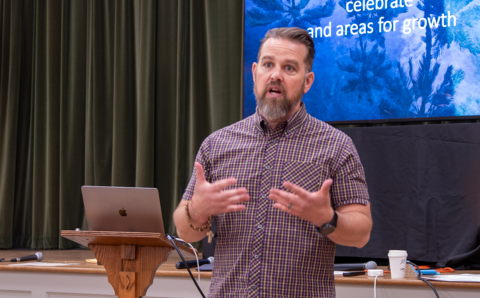Having served in youth ministry for almost 20 years, I know one thing for certain: Nothing changes so rapidly as youth culture. Culture no longer shifts over a generation. It happens overnight.
For those in youth ministry, one of the most exhausting challenges is staying relevant. A persistent fear is becoming an out-of-touch “old person,” so we might risk spending too much time engaging the culture and too little time confronting it with the countercultural message of the gospel. It’s easy to fall into the trap of catering to trends in hopes of winning youth to Jesus, but this reactive approach might lead to misplaced priorities and unintended consequences.
The church has always been called to be countercultural, an alternative to the values of the world. What does that look like in youth ministry today? It starts by recognizing that the field is fertile for sowing the gospel. Young people aren’t uninterested in God; they are weary of how the church has been presenting Jesus to them. What they crave is purpose, community, meaning, and ritual.
The culture our young people have been raised in and shaped by has sold them a utopian world of digital comfort. But the church offers a culture that is instead personal and present, one where belonging is crucial and suffering is welcomed and even expected.
The Fertile Field
In her book Strange Rites: New Religions for a Godless World, Tara Isabella Burton paints a picture of the religious character of young people today that is simultaneously depressing and hopeful. She believes that we do not live in a godless society, but rather a “spiritual, not religious society.”
Burton calls the “spiritual, not religious” group “Remixed.” They “envision themselves as creators of their own bespoke religions, mixing and matching spiritual and aesthetic and experiential and philosophical positions … (and) rejecting authority, institution, creed, and moral universalism. They value intuition, personal feeling, and experiences. They demand to rewrite their own scripts about how the universe, and human beings, operate. They want to choose—and, more often than not, purchase—the spiritual path that feels more authentic, more meaningful to them. … And they want, when available institutional options fail to suit their needs, the freedom to mix and match, to create their own daily rituals and practices and belief systems.”
That’s not all bad news. The Remixed, Burton says, long for the same things we all do: “a sense of meaning in the world and personal purpose within that meaning, a community to share that experience with, and rituals to bring the power of that experience into achievable, everyday life.”
Meaning, purpose, community, and ritual are what all people—especially young people—are searching for in their spiritual journeys. Even “secular” people hunger for “a spiritual identity and surrounding community that precisely reflects their values, their moral and social intuitions, their lived experience, and their sense of self,” Burton writes. Whoever offers that will win them over.
The field is fertile and ready, and it only takes a quick scan of what’s “winning” in youth culture today to see it. A Taylor Swift concert is likened to a spiritual experience. Tables hosting games of Dungeons and Dragons become a chapel for some. Church attendance and travel sports remain locked in battle, and the battle to offer meaning, purpose, community, and ritual is being won by the culture. The world has offered solutions to spiritual longings and desires, and many feel the church has not.
The challenge for the church, then, is to go out onto the field and get in the game. I am one of those pastors who spent a lot of hours in my office strategizing how I could pull the field into my church. It wasn’t until I left the office to go to the field that I started to see the true opportunity ready and waiting.
I have the privilege of serving as the chaplain for East Kentwood (Mich.) High School’s varsity football team. In my first year, I caught a vision for how fertile the field truly was. Studying the book of James after practice in the locker room became “church” for some of these kids as they opened God’s Word for the first time. Simply speaking, God’s Word was enough for them. Exegetical breakdowns and historical context weren’t needed. They only needed the Word of God to be spoken.
One memory I will cherish forever is when I read James 2:19 aloud. There were some students listening from afar, not participating, who heard, “You believe that there is one God. Good! Even the demons believe that—and shudder.” To my great surprise and joy, one of the listeners, who I was sure didn’t like me, exclaimed, “Man, Coach, that’s deep. I really needed to hear that today. Thank you!” Praying to have this kind of opportunity in your office is not a vain effort, but neither is going out onto the field, on their turf, to share God’s Word in faith.
The world doesn’t offer true purpose, meaning, community, and ritual like the body of Christ empowered by the Holy Spirit does. Offering an enticing alternative ironically begins by asking the same questions as the culture we’re seeking to counter: How do we offer people meaning, purpose, community, and ritual in our time together? What follows are the four things I believe need to be prioritized in the counterculture we can offer.
Personal over Digital
The thousands of digital communities that exist for young people offer them meaning, purpose, and ritual. Though they might offer more efficiency, ease, and effectiveness and undeniably reach more people, we saw evidence during the COVID pandemic that digital communities lack the transformational relational depth of personal, physical communities.
The physical act of gathering as brothers and sisters in Christ isn’t just a command and encouragement we find in Scripture (Heb. 10:24-25; 1 Thess. 5:11). It is also a gift from God: “How good and pleasant it is when God’s people live together in unity!” (Ps. 133:1).
Humans desperately need to meet with each other face-to-face. We can pretend to care, but we can’t pretend to show up. Physical presence requires sacrifice, but it’s worth the cost. Practically, we are countercultural when we care less about the number of people we’re reaching for Christ and care more about each individual and their walk with Christ. We are countercultural when we know the name of each person who walks through the doors.
In a world obsessed with the newest digital platforms to connect us across our devices globally, spurning technological advancement in favor of human connection is certainly countercultural.
Belonging Over Authenticity
Authenticity in and of itself is not a bad thing—if by “authentic” one means “genuine, real and transparent.” However, I fear that the type of authenticity promoted in our culture has the potential for far more damage than good.
In his book Ethics of Authenticity, philosopher Charles Taylor contends that the dominant form of authenticity in our culture today was born in the 1800s out of Romantic ideals. Fundamentally it elevates individual expression and diminishes the importance of relationships. Taylor argues this “authenticity” is just “self-determining freedom” masked as authenticity.
The danger Taylor sees with this kind of authenticity is that to be your most authentic self, there must be some type of rebellion against oppressive forces seeking to make you submit. “Indeed,” he writes, “the very idea of originality (authenticity), and the associated notion that the enemy of authenticity can be social conformity, forces on us the idea that authenticity will have to struggle against some externally imposed rules.”
For Christians, this type of authentic expression of self flies in the face of Jesus’ kingdom ethics of authenticity. “Whoever wants to be my disciple,” Jesus said, “must deny themselves and take up their cross and follow me. For whoever wants to save their life will lose it, but whoever loses their life for me will find it” (Matt. 16:24-25).
We are socially conforming creatures by nature. All one needs as proof are the uniforms for sports teams, schools, hobbies, and jobs. We often blindly conform socially in order to belong in a community. I am not suggesting that we also espouse blind social conformity to the authority of the church. That’s not what Jesus modeled. He constantly confronted and challenged the social, cultural, and religious norms of his day. Jesus’ example shows us a different way forward for confronting and challenging norms—a way in which we still know we belong and our authenticity can remain intact.
Jesus showed us that true authenticity does not come from independence from or rebellion against external authorities and norms. Jesus could be the most authentic version of himself because he knew how much he was unconditionally loved by the Father. This feeling of acceptance and belonging from the Father was so meaningful, purposeful, and life-giving that Jesus thought it unthinkable to rebel against such unconditional love. He fully submitted himself to the Father, even to death on a cross.
For us, too, the beginning of true belonging and the foundation for true authenticity is in the recognition and experience of being loved unconditionally first by God. People will not believe until they know they belong. The most effective way we can communicate that young people belong—that they don’t have to turn to rebellious “authenticity” to find their true selves—is to love them unconditionally as they are today, just as God loves us.
Suffering Over Comfort
Consider the words of the apostle Paul in 2 Corinthians 4:7-12: “But we have this treasure in jars of clay to show that this all-surpassing power is from God and not from us. We are hard pressed on every side, but not crushed; perplexed, but not in despair; persecuted, but not abandoned; struck down, but not destroyed. We always carry around in our body the death of Jesus, so that the life of Jesus may also be revealed in our body. For we who are alive are always being given over to death for Jesus’ sake, so that his life may also be revealed in our mortal body. So then, death is at work in us, but life is at work in you.”
Ask yourself the following questions considering this passage:
- Why would God put the invaluable treasure of God’s glory into fragile vessels?
- Why doesn’t God save us from being hard pressed, perplexed, persecuted, and struck down?
- If Jesus is alive in my heart, how is it that death is at work in me, and why am I giving myself over to it?
God places a valuable treasure in unimpressive clay so that when it breaks in hard times and the light of the Holy Spirit shines through us, people will know it is God at work in us and not ourselves.
But why doesn’t God save me from pain and suffering in the first place? An unfortunate lie adopted by some in our current culture is that if you become a Christian and give your life to Jesus, he will make everything better and you’ll be happy. Jesus wants to rescue us from suffering, right?
Wrong.
Jesus provides us with the strength to be content in him, no matter the circumstances—whether in plenty or in want, in sickness or in health, imprisoned or free. Jesus never once promised us comfort objectively in this world. To the contrary, he promised that life would be hard in this world if we choose to follow him.
Perhaps God knows that’s what draws us and others into deeper dependence on him. And if we partner with Jesus in his sufferings and death, we will partner with him in the bodily resurrection when he returns.
No one likes to suffer. No one gleefully welcomes pain. In a world determined to eradicate pain and suffering, what a countercultural witnessing opportunity we have for the sake of the gospel when we not only accept pain and suffering, but welcome it with the expectation that God will be present and cause growth through the power of the Holy Spirit.
It seems like a simple concept, but the church was never meant to be a support leg or offshoot of the culture we live in. It has been, continues to be, and will forever exist as the body of Christ that faithfully engages the culture of the world while living and proclaiming the alternative culture of the kingdom of God.
The church can offer an enticing yet faithful counterculture when it prioritizes the personal over the digital, offers belonging rather than encouraging individualism, and welcomes suffering rather than trying to avoid it. And this counterculture can offer the deeper, truer sense of meaning, purpose, community, and ritual that young people are longing and searching for.
About the Author
Arek O’Connell is an outreach and young adult pastor and a Doctor of Ministry candidate at Gordon-Conwell Theological Seminary. He lives in Grand Rapids, Mich., and attends Hillside Community Church.









